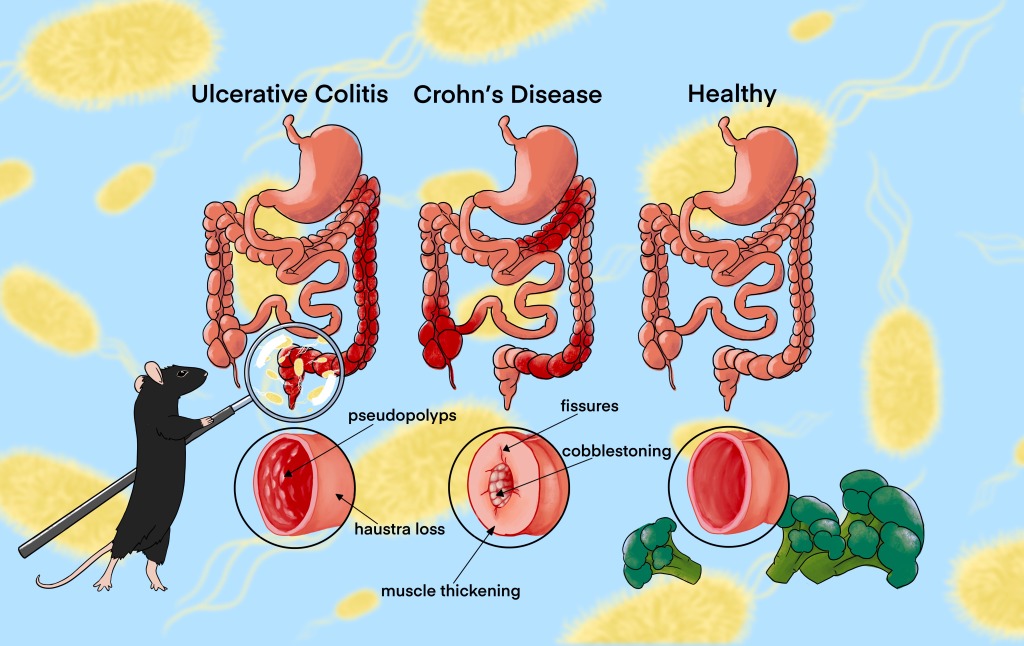
You’ve probably grown up hearing that you need to eat your vegetables, and that’s because they contain a lot of nutrients and chemical compounds that can provide benefits to us. We are investigating a compound in broccoli sprouts that is inactive when we eat it, but that can be transformed into an anti-inflammatory compound by certain microbes in our digestive tract.
This research is possible because of multiple teams working together

This work is a collaboration across multiple institutions. The nutrition and microbial parts, as well as the organization of the different teams, is being led by the Li and Ishaq Labs at the University of Maine.
Collectively, we are researching the health effects of eating steamed broccoli sprouts, including benefits to nutrition, gut health and microbes, and reducing inflammation.

The Nutritional and Biochemical-focused team members





The Microbiology-focused team members






Note, we have additional microbiology undergraduate team members who were too shy to be named here.
The Microbial Ecology and Bioinformatics-focused team members




Broccoli sprouts contain all sorts of useful compounds

Some bitter compounds in cruciferous vegetables, such as in broccoli, are there to deter insects from eating the plants.
Compounds like glucosinolates can be transformed by specific enzymes in the broccoli, to make isothiocyanates, which are a group of chemicals that act as natural pesticides against insects.
What is really cool, is that these same isothiocyanate compounds act as anti-inflammatories in humans!
You read all about the benefits of sulforaphane (the isothiocyanate we are really interested in) by checking out the publications from the Li lab.


Humans do not make the specific digestive enzymes to break down the glucosinolates and make the anti-inflammatory compounds on our own. But, some of the microbes that live in our intestines can!
The bacteria do not use the isocyanate compounds directly, so they are available for our intestines to absorb and we can use them.
You can read all about the compounds in broccoli sprouts, our gut microbes, and health, in a literature review that our team wrote to summarize what is currently known.
We want to know if we can recruit gut microbes to help us take the glucosinolates from the cruciferous vegetables we eat, and make the anti-inflammatory isothiocyanates that we can use to improve our health. The Li lab and collaborators have been working on sprouts and sulforaphane for over a decade, especially whether they can be used to reduce inflammation and other symptoms of Inflammatory Bowel Disease.

In the past few years, with the addition of the Ishaq Lab, we have been able to add more research exploring where microbes are located in the gut, how different locations respond to broccoli sprouts in the diet, which microbes are responsible, and how we can make better use of these microbes.


With each small research project, our research reveals another piece to the puzzle that is human health. Understanding how we work with our microbes in sickness and in health, is a long and complicated question because each person has an individual collection of microbes and people react differently to the same food items.
Over time, and with many collaborators, we are adding knowledge about how to use broccoli sprouts or other cruciferous vegetables in the diet to help people with Inflammatory Bowel Disease.
What we are working on lately…

The Li and Ishaq labs are running a small study in 2023 with some participants around Bangor, Maine.
We are investigating how eating broccoli sprouts can change your gut microbes and whether they will produce this anti-inflammatory for our participants. We will also investigate how people feel about eating broccoli sprouts, and what would make them more or less likely to eat broccoli sprouts.
Since this study is ongoing, we will have small updates throughout the year, and we expect to have results to share in 2024.
As you can see, we have a lot of fun working together and discovering new reasons to love broccoli!

Acknowledgements to those supporting this work
These projects would not be possible without a lot of support! We thank the University of Maine, especially the School of Food and Agriculture, for their financial and material support for us as researchers and educators. We thanks the UMaine Institute of Medicine for their continued support for our work and for connecting biomedical research in the state.
We are supported by the USDA National Institute of Food and Agriculture through the Maine Agricultural & Forest Experiment Station: Hatch Project Numbers ME022102 and ME022329 (Ishaq) and ME022303 (Li); the USDA-NIFA-AFRI Foundational Program [Li and Chen; USDA/NIFA 2018-67017-27520/2018-67017-36797]; and the National Institute of Health [Li and Ishaq; NIH/NIDDK 1R15DK133826-01]. Johanna Holman is supported by ME0-22303 (Li), Marissa Kinney and Alexis Kirkendall are supported by National Institute of Health [Li and Ishaq; NIH/NIDDK 1R15DK133826-01], Tolu Alaba is supported by the Allen Foundation, Lola Holcomb and Marissa Kinney are supported by US National Science Foundation One Health and the Environment (OG&E): Convergence of Social and Biological Sciences NRT program grant DGE-1922560, and Lola Holcomb and Tolu Alaba are supported by the UMaine Graduate School of Biomedical Science and Engineering.
Peer-reviewed scientific publications

Early life exposure to broccoli sprouts confers stronger protection against enterocolitis development in an immunological mouse model of inflammatory bowel disease.
Interviews, news stories, and recent blog posts
- Interviewed by Mark Martin on the Matters Microbial podcast, “Episode #27: Broccoli Sprouts, Gut Health, and Microbes for All with Sue Ishaq”, Feb 9, 2024.
- “Can broccoli sprouts be used to treat IBD? UMaine researchers investigate”, Carly D’Eon, News Center Maine, Nov 22, 2022.
- “UMaine researchers studying whether broccoli sprouts can help prevent and treat inflammatory bowel disease”, Marcus Wolf, UMaine News.
Previous Team Members
Jahnavi Pathak, Professional Studies Master’s in Bioinformatics, Jan 2023 – May 2023 (graduated)
Ryan Wijayanayake, Master’s of Professional Studies in Animal Science, Jan 2023 – July 2023 (completed independant study requirement)
Undergrads Louisa Colucci, Dorein Baudewyns, Joe Balkan, Lilian Nowak, Jaymie Sideaway, Aakriti Sharma.




